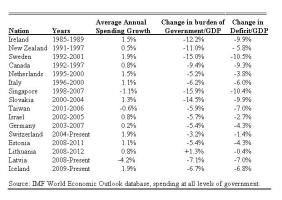
The good thing about being a libertarian (above and beyond respecting the rights and liberties of other people) is that you can always say “I told you so” when government intervention leads to bad results. Obamacare is a very good (albeit very painful) example.
The bad thing about being a libertarian is that you don’t win many victories. No matter how much evidence is on your side, politicians usually do the wrong thing. Not because they are necessarily evil.  They’re simply responding to “public choice” incentives.
They’re simply responding to “public choice” incentives.
Indeed, the only big victory that I’ve had in recent years was the sequester. And even that victory has been tarnished by the 2013and 2015 deals that weakened the caps on discretionary outlays.
So I’m delighted to report that Brazil has actually amended its constitution to impose a spending cap. I was somewhat hopeful that this might happen when I wrote about the issue back in October, but never allowed myself to think it would actually happen.
The Wall Street Journal reports on this remarkable development.
Brazil’s Senate approved a measure capping public spending, delivering a victory to embattled President Michel Temer, who is struggling to close a massive budget deficit and revive the nation’s moribund economy. In an unusually rapid session with little discussion, lawmakers on Tuesday voted 53 to 16 to approve a constitutional amendment limiting the country’s annual spending growth to the previous year’s inflation rate. The move was a drastic shot of discipline for Brazil’s government, whose public debt and deficits have expanded at rates so worrisome that three major credit agencies have downgraded the nation’s credit rating to junk status. Several economists and analysts praised the constitutionally enforced limits as the only way for Brazil’s government to live within its means and restore investor confidence.
It’s remarkable that Brazil’s politicians were willing to tie their own hands, but they presumably had no choice because the nation’s finances deteriorated to the point that drastic measures were necessary.
The spending cap applies to the federal budget starting in 2017, except for education and health costs, which will be subject to the limits starting in 2018. It was the centerpiece of austerity measures proposed by Mr. Temer to shore up Brazil’s shaky public finances. Brazil’s budget deficit was a hefty 8.3% of gross domestic product in October, after growing almost steadily from 1.8% of GDP in July 2011. Gross debt was 70.3% of GDP in October, up from its more recent low of 51% of GDP in December 2012.
As you might expect, there was opposition.
..the measure drew the ire of opposition politicians, labor unions and citizens concerned that spending limits could harm Brazil’s troubled health-care and education systems.
So it is impressive that the this constitutional reform received supermajority support for two votes in the Brazilian House, followed by supermajority support for two votes in the Brazilian Senate.
 I would like to think I played at least a tiny role in this development. I’ve crunched numbers showing that nations get very good results when spending is restrained for multi-year periods.
I would like to think I played at least a tiny role in this development. I’ve crunched numbers showing that nations get very good results when spending is restrained for multi-year periods.
I’ve written extensively on the successful spending caps in Switzerland and Hong Kong, both of which are part of those nations’ constitutions.
And I’ve highlighted the fact that international bureaucracies, when they investigate the efficacy of various fiscal rules, always conclude that spending caps are the only effective approach.
I also wrote an article for the Brazilian media back in October.
But even if I had no impact on the debate, I’m still very happy about the outcome.
Assuming, of course, that Brazil doesn’t have a Supreme Court Justice like John Roberts who will somehow make a politicized decision and sabotage the new spending cap!
P.S. I seem to have more success overseas than in the United States. I did help defeat the income tax in the Cayman Islands a few years ago, and I also hope that my recent trip to Vanuatu will lead to a similar outcome.
But since I’m a patriot (in the proper sense) who wants the United States to be a beacon of liberty for the world, it sure would be nice to win a few battles here at home.
P.P.S. Brazil may be on the cusp of other pro-market reforms, in part because of a vibrant libertarian movement in the country.
Here’s a video from Reason on this positive development.
Jeff Tucker of the Foundation for Economic Education has a very upbeat assessment.
I went on a three-city speaking tour in Brazil. …I found an amazingly well-educated crowd of students, young professionals, professors, media personalities, and digital activists, all dedicated to using the upheaval to the advantage of freedom itself. Organizations like Mises Brazil, and many others that have spun off from Students for Liberty and other organizations, have spent years translating and distributing books and articles, holding seminars, and cultivating young people for a life of activism. …The libertarians in Brazil seem to understand that ideological slogans and promises for change mean nothing so long as states are huge, invasive, and offer a bounty to anyone who gains power.
Let’s hope this is right and Brazil becomes a star reformer. Chile (and, in recent years, Peru) have been lonely outposts of good policy in South America.








Fernando Jr / December 19, 2016
@PPDNews The unlimited government spending created the biggest economic crisis in the history of the country.
/